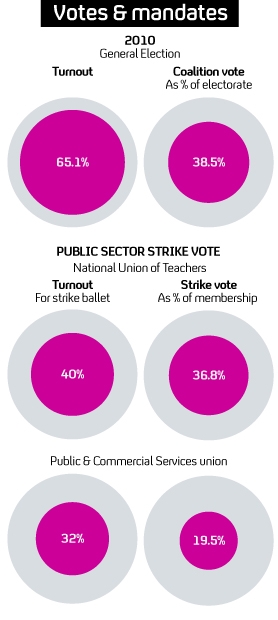Strike threat sparks row over who’s got the biggest mandate
Union leaders insist they have a “convincing” mandate for mass industrial action despite low turnouts for strike ballots.

Union leaders are insisting they do have a mandate for mass industrial action despite a low turnout for Wednesday’s strike ballots.
Up to 750,000 public sector workers will take part in a 24-hour walkout on June 30, and there are fears that twice that number of public sector workers could eventually join in an “autumn of discontent” over pensions, pay and job losses.
The news comes after members of the Public and Commercial Services union voted by 61.1 per cent in favour of strikes. But the turnout was just 32.4 per cent, meaning that just 19.5 per cent of the union’s membership is backing a walkout.
On Tuesday, member of the National Union of Teachers (NUT) and the Association of Teachers and Lecturers (ATL) also voted to join the strike, with 92 per cent of NUT voters backing industrial action and 83 per cent of ATL voters.
Turnout was 40 per cent among state school members of the NUT and 27 per cent among private school members. Overall turnout for the ATL ballot was 35 per cent.
Cabinet Office minister Francis Maude said the turnout in the PCS ballot was “very low”, with fewer than 20 per cent of the union’s members supporting the “unnecessary” industrial action.
But PCS leader Mark Serwotka said the mandate was “convincing”.
Last year the Mayor of London, Boris Johnson, joined the Confederation of British Industry (CBI) in calling for a law insisting on a minimum 50 per cent turnout for a successful strike ballot.
Union leaders say turnouts would be higher if they were allowed to use modern methods like online voting.
The Conservatives and Liberal Democrates got 59.1 per cent of the vote at last year’s General Election. The turnout was 65.1 per cent, meaning less than 40 per cent of the total electorate voted for one of the coalition partners.
Last week the Archbishop of Canterbury, Dr Rowan Williams, questioned whether the Coalition had a mandate for reform, saying ministers were committed to “radical, long-term policies for which no-one voted”.
Business Secretary Vince Cable said: “The two parties of the coalition got substantially more than half of the total vote at the last election and the public knew that we were going to have to embark on very difficult changes connected with sorting out the massive budget deficit problems, so I don’t think that criticism has much weight.”
-
Latest news
-
‘Russian aggressions have never pushed Georgia to deviate from its own path’, says Georgian President5m

-
Why is Georgia’s ruling party so intent on adopting ‘foreign influence’ bill?5m

-
Trump’s lawyers try to paint Michael Cohen as liar out for revenge at trial3m

-
England’s schools told not teach gender identity2m

-
Slovakia PM shooting: Suspect charged with attempted murder3m

-




